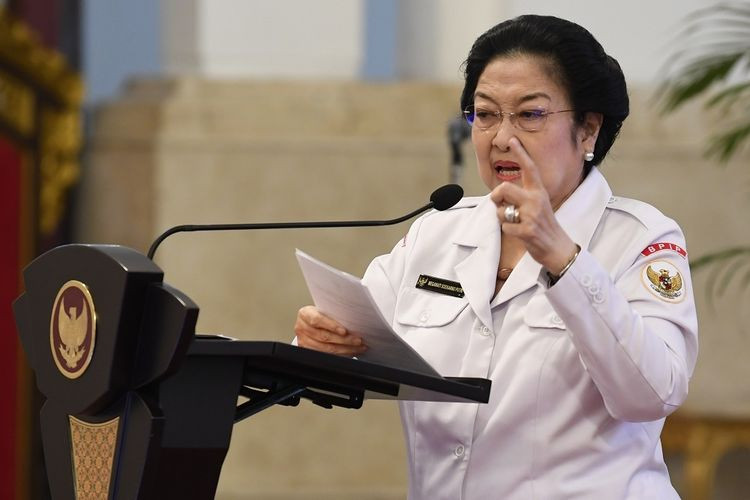PDI-P boosts influence at strategic institutions
Largest pro-government party braces for post-Jokowi politics
Change Size

T
he Indonesian Democratic Party of Struggle (PDI-P) is continuing to take over key positions at state institutions in a development likely to further consolidate its power in maintaining the status quo and its political future afloat.
The recent promotion of PDI-P politician Darmawan Sarpodjo as president director of the state electricity company (PLN) to replace seasoned banker Zulkifli Zaini has prompted criticism, with the opposition Prosperous Justice Party (PKS) questioning the move, as it came at a time when PLN was doing well.
The PKS also called on the government “not to politicize” the second largest state-owned company.
When asked about Darmawan’s appointment, PDI-P executive Djarot Saiful Hidayat said the new PLN chief was a man of professionalism and integrity. “I know Mas Darmawan is professional, smart, has integrity and sufficient experience to manage a strategic company like PLN. He has a good track record,” he said, as quoted by tribunnews.com.
Prior to his promotion, Darmawan was PLN vice president director, a post to which he was appointed in 2019 after serving as an adviser at the Executive Office of the President for four years since 2015. Before that, he was an adviser to President Joko “Jokowi” Widodo during the 2014 presidential election after failing his own bid for a seat at the House of Representatives during the legislative election.
The economist-turned-politician is among a long list of PDI-P politicians who have been appointed to high-level positions since Jokowi was reelected in 2019.
Control of SOEs
Since business tycoon and former Jokowi campaign manager Erick Thohir was appointed as State-Owned Enterprises (SOEs) Minister, a growing number of PDI-P cadres have been appointed to top SOE posts.
Earlier this year, Budiman Sudjatmiko was tapped for an independent commissioner of company PT Perkebunan Nusantara (PTPN) V.
PTPN V is under state-owned plantation holding company PTPN III, which former SOEs minister Dahlan Iskan claimed was “one of the world's five largest plantation groups”.
Last year, Erick also appointed members of the ruling party, including Arif Budimanta, Zuhairi Miswari and Dwi Ria Latifa, to executive positions at a number of SOEs. The most headline-grabbing appointment was that of former Jakarta governor Basuki “BTP” Tjahaja Purnama, who was tapped for president commissioner of state-owned energy holding company Pertamina in 2019, just two years after he had joined the PDI-P ahead of the 2017 Jakarta gubernatorial election.
Appointing politicians to key positions at SOEs, which are often seen as political cash cows, is not uncommon in Indonesian politics that is notoriously rife with rent-seeking.
Experts have suggested that the growing number of PDI-P members appointed to leadership positions at SOEs was part of the ruling party’s grand strategy to reassert its influence in order to secure its future in post-Jokowi national politics.
Executive positions at SOEs were considered more attractive than seats on the Cabinet, they said, as political parties needed to prepare large funds now for contesting the general elections in 2024.
“This is a good [time] for the PDI-P to consolidate its power base,” said political scientist Mada Sukmajati from Gadjah Mada University.
“By gaining access to the state’s economic resources, they [the appointees] are making sure they have leverage over the party's finances,” he said.
Coopting state ideological apparatuses
In addition to gaining control of certain SOEs, the PDI-P is now seen to be tightening and expanding its control of institutions that manage the state ideology.
The Pancasila Ideology Development Board (BPIP), established in 2018 with a sweeping mandate to promote and safeguard “Pancasila values”, is now headed by PDI-P matriarch Megawati Soekarnoputri.
Megawati’s role was later expanded to also include chief advisor at the National Research and Innovation Agency (BRIN), which Jokowi established in 2019 upon the advice of Megawati, among others. The agency now oversees the Indonesian Institute of Sciences (LIPI), the Agency for the Assessment and Application of Technology (BPPT), the National Nuclear Agency (Batan), the Eijkman Institute for Molecular Biology and the National Institute of Aeronautics and Space (Lapan).
Critics, including the wider academic community, have reacted strongly to Megawati’s BRIN appointment, which her party could use to “weaponize Pancasila” to eliminate its political enemies as well as curb academic freedom in the country.
“The BPIP and BRIN are the only ways the PDI-P can maintain its presence” as regards the state ideology, said political scientist Agus Riewanto from Sebelas Maret University. “The PDI-P can safeguard the national ideology from within and without for its own benefit.”
During a time when party identification was declining and national politics had come to be dominated by personalities rather than ideologies, such a move could also help the party distinguish itself from its competitors, Agus added.
“By using ‘safeguarding Pancasila’ as a selling point, the PDI-P will also be regarded by the public as the party that is maintaining national stability,” he said.
Megawati’s long-term strategy?
The PDIP’s growing control over state entities and institutions not only elevates its standing as a key player in national politics, but also reaffirms Megawati’s growing political clout, according to LIPI political analyst Firman Noor.
“Megawati herself will achieve more credit in the eyes of her loyalists and party members,” Firman said. “The more she is given positions and titles, the more centralized her figure in the party will become.”
Her increasingly queen-like role was also making it harder for whomever her successor might be to assume the party leadership without prompting division, Agus said, and the party would thus focus on consolidating its power to contest the 2024 elections.
This means that both the country’s political scene and the Indonesian public are likely to continue to see Megawati for the foreseeable future, wielding her influence to secure the party’s already huge political clout, if not dominance.
“It is likely that she will continue to [remain] the party leader as she ages, making sure that the party performs well,” Agus said. (ahw)









